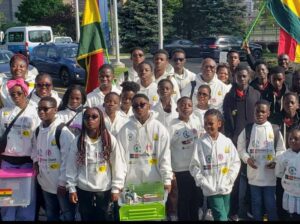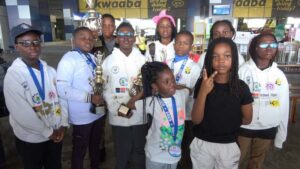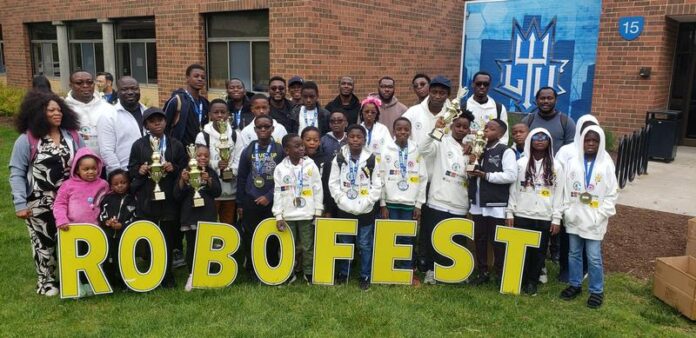From the bustling workshops of the Ghana Robotics Academy Foundation to the prestigious halls of Lawrence Technological University in Michigan, a new chapter unfolded in the global robotics narrative.
At last weekend’s Robofest World Championships, Ghana’s brightest young minds made an impressive mark. Teams from Mikrobot Academy, Apam Senior High School, Right to Dream Academy, and Our Lady of Grace Senior High School (OLAG) didn’t just participate—they tenaciously secured top positions across multiple fiercely contested categories.
Robofest, an annual intellectual challenge organized by Lawrence Tech, invites students ranging from upper elementary to college levels to conceive, construct, and code autonomous robots capable of performing complex tasks.
This competition is not merely about gears and circuits; it serves as a crucible for creativity, a forge for problem-solving, and a vital training ground for future STEM leaders. With participants hailing from over twenty countries, Robofest has earned its reputation as a hotbed of innovation, nurturing the skills that will drive tomorrow’s scientific and technological advances.
At the heart of Ghana’s success lies Mikrobot Academy—a private robotics and STEM education beacon founded in 2014.

With branches in Accra, Kumasi, Tema, and Tarkwa, Mikrobot Academy inspires students aged 7 to 14 through hands-on, project-based learning, fostering critical thinking, problem-solving skills, and genuine innovation.
This year’s Robofest Game Challenge, “Robot Parking Valet,” immersed participants in the complexities of autonomous navigation, precise object manipulation, and spatial reasoning.
Within a tight two-minute window, teams programmed their robots to simulate a futuristic valet service: surveying parking lots, nudging stray LEGO bricks off boundaries, retrieving a symbolic “key,” transporting a “black vehicle” to a pickup point, parking a “white vehicle” in its space, and finally finding their own parking spot revealed only during competition.
Mikrobot Academy fielded four teams across the Unknown Mission Challenge (UMC), Game, Bottle Sumo, and Robo Parade categories.
The “Prime Coders,” a powerhouse team from Mikrobot’s Kumasi and Accra branches—featuring Kofi Osei Afriyie, Patrick Quansah, Francis Quansah, Yaw Kusi Agyapong, Setornam Agbemenu, Roni Kponyo, Emmanuel Kponyo, and Jedi Odoom—competed in the UMC. They secured 2nd place, matching their impressive feat from the previous year. Meanwhile, Team Neo-Nexus—Israel Yeboah Awuah, Emmanuel Nyhira Pobee, and Philip Asumah Jnr—excelled in the Game category, earning the prestigious Special Achievement Award, recognizing their groundbreaking innovation and perseverance.

In the senior division, OLAG’s team took 3rd place in the Game category and 4th in the Bottle Sumo time trial. Apam Senior High School’s senior team also made waves, claiming 2nd place in the Bottle Sumo time trial.
A Robofest victory goes far beyond trophies. For these young participants, it ignites confidence and a passion for STEM fields, often laying the foundation for future careers in science, technology, engineering, and mathematics.
The competition hones teamwork, leadership, problem-solving, and innovation—skills that open doors to scholarships, internships, and advanced study opportunities. Moreover, it inspires a spirit of entrepreneurship and ambition to tackle even greater challenges.
Nationally, these achievements elevate Ghana’s profile in the global technology arena and demonstrate the immense potential of its youth. They motivate countless young Ghanaians to embrace creativity, digital literacy, and technological advancement—critical factors for national development in our digital age.
This inspiring success is the product of collaboration between the Ghana Robotics Academy Foundation, the CSIR-Institute for Scientific and Technological Information, Mikrobot Academy, the Responsible Artificial Intelligence Lab, and the KNUST College of Engineering Innovation Center. This partnership uniquely connects junior and senior high school students with expert researchers, allowing them to tackle real-world problems beyond the classroom.
These young innovators are not merely experimenting with science—they are actively advancing it. Last year, over sixty students engaged in this dynamic learning environment, divided into elementary, junior, and senior groups, working on challenges such as food insecurity, urban sustainability, and autonomous mapping systems.
The resounding success at this year’s Robofest World Championships is more than a collection of accolades—it’s a vibrant testament to the power of nurturing young talent and the transformative potential of hands-on STEM education in shaping a brighter future for Ghana.



